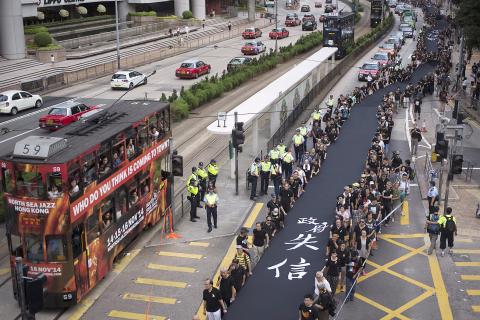Thousands of pro-democracy activists clad in black marched silently through Hong Kong yesterday, holding banners saying they felt betrayed and angry at Beijing’s refusal to allow fully democratic elections for the territory’s next chief executive in 2017.
The protesters, who carried enormous black cloth ribbons through the streets, also held up signs calling for further civil disobedience and cheering on students planning to boycott classes.
“Occupy Central with Love and Peace,” and “Support students boycotting classes,” read some of the signs.

Photo: EPA
“Beijing has breached our trust. Universal suffrage is hopeless,” read another.
Dozens of pro-establishment protesters gathered nearby waving banners and cursing the democracy activists and students.
“Students should focus on studying,” shouted Pok Chun-chung, an organizer of the pro-establishment “Protect Hong Kong” movement. “If you adults have guts then you should occupy Central yourself, not use children as cannon fodder.”
The protest remained peaceful and police stood by. Organizers estimated there were about 4,000 marchers at the height of the protest. Police estimated 1,860.
Yesterday’s march was the latest in a series of confrontations between pro-democracy activists and pro-establishment forces over the extent to which Hong Kong may go ahead with democratic reforms.
A former British colony, Hong Kong was returned to Chinese rule in 1997 under a “one country, two systems” form of government. It was given wide-ranging autonomy, including an undated promise of “universal suffrage.”
Beijing this summer has made it clear it would not allow fully democratic elections in the near future. Pro-democracy activists say China’s decision to tightly control who can be nominated for the 2017 vote means Hong Kong risks ending up with a “fake” democracy.
Earlier yesterday, Hong Kong Chief Executive Leung Chun-ying (梁振英) published an open letter to residents of the territory, urging them to be “pragmatic” and to form an “accurate and complete understanding of the constitutional and political context in which we find ourselves.”
He said constitutional reform should move forward whatever the pace and that there could be additional reforms in the future.

INVESTIGATION: The case is the latest instance of a DPP figure being implicated in an espionage network accused of allegedly leaking information to Chinese intelligence Democratic Progressive Party (DPP) member Ho Jen-chieh (何仁傑) was detained and held incommunicado yesterday on suspicion of spying for China during his tenure as assistant to then-minister of foreign affairs Joseph Wu (吳釗燮). The Taipei District Prosecutors’ Office said Ho was implicated during its investigation into alleged spying activities by former Presidential Office consultant Wu Shang-yu (吳尚雨). Prosecutors said there is reason to believe Ho breached the National Security Act (國家安全法) by leaking classified Ministry of Foreign Affairs information to Chinese intelligence. Following interrogation, prosecutors petitioned the Taipei District Court to detain Ho, citing concerns over potential collusion or tampering of evidence. The

‘FORM OF PROTEST’: The German Institute Taipei said it was ‘shocked’ to see Nazi symbolism used in connection with political aims as it condemned the incident Sung Chien-liang (宋建樑), who led efforts to recall Democratic Progressive Party (DPP) Legislator Lee Kun-cheng (李坤城), was released on bail of NT$80,000 yesterday amid an outcry over a Nazi armband he wore to questioning the night before. Sung arrived at the New Taipei City District Prosecutors’ Office for questioning in a recall petition forgery case on Tuesday night wearing a red armband bearing a swastika, carrying a copy of Adolf Hitler’s Mein Kampf and giving a Nazi salute. Sung left the building at 1:15am without the armband and apparently covering the book with a coat. This is a serious international scandal and Chinese

Seventy percent of middle and elementary schools now conduct English classes entirely in English, the Ministry of Education said, as it encourages schools nationwide to adopt this practice Minister of Education (MOE) Cheng Ying-yao (鄭英耀) is scheduled to present a report on the government’s bilingual education policy to the Legislative Yuan’s Education and Culture Committee today. The report would outline strategies aimed at expanding access to education, reducing regional disparities and improving talent cultivation. Implementation of bilingual education policies has varied across local governments, occasionally drawing public criticism. For example, some schools have required teachers of non-English subjects to pass English proficiency

TRADE: The premier pledged safeguards on ‘Made in Taiwan’ labeling, anti-dumping measures and stricter export controls to strengthen its position in trade talks Products labeled “made in Taiwan” must be genuinely made in Taiwan, Premier Cho Jung-tai (卓榮泰) said yesterday, vowing to enforce strict safeguards against “origin laundering” and initiate anti-dumping investigations to prevent China dumping its products in Taiwan. Cho made the remarks in a discussion session with representatives from industries in Kaohsiung. In response to the US government’s recent announcement of “reciprocal” tariffs on its trading partners, President William Lai (賴清德) and Cho last week began a series of consultations with industry leaders nationwide to gather feedback and address concerns. Taiwanese and US officials held a videoconference on Friday evening to discuss the